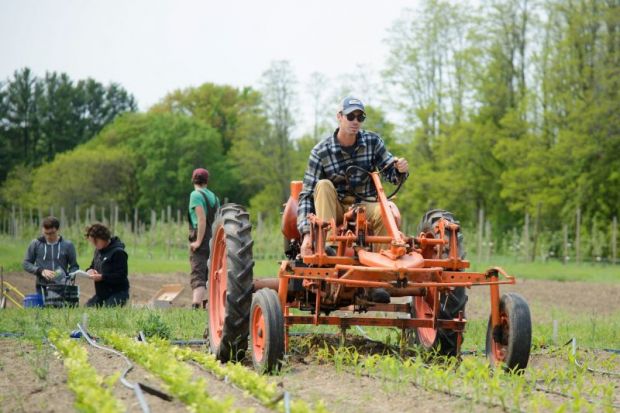It wasn’t long ago that Evan Hoyt was sitting for 45 to 50 hours a week in front of a computer screen, with little exercise beside his bicycle commute to and from his technology job in San Francisco.
Now Mr Hoyt, 25, works outdoors all day, planting onions, kale, tomatoes and dozens of other kinds of vegetables. He’s learning livestock management, disease and pest control, and how to drive a tractor. He’s also learning how to weed, harvest, pack, store, deliver and sell the produce only now beginning to grow in the cool northern climate in Vermont near the US border with Canada.
Ask him which life he prefers and he doesn’t hesitate a moment. “I’m going to go with this one.”
Mr Hoyt is among a fast-growing crop of students in an equally fast-growing number of US university programmes that have zeroed in on the explosion of interest in local, urban and sustainable farming.
Like him, many are giving up lucrative careers for the lure of what he calls “something more inspiring”. And universities are happy to oblige with courses that set them on their new path.
A soon-to-be-published study by the University of Michigan Sustainable Food Systems Initiative has found that there are now 52 programmes in sustainable food systems in the US, including 17 undergraduate majors, 15 minors, nine postgraduate courses, six that confer certificates, and a handful that are online.
Enrolment in these is increasing exponentially. The one at Michigan has more than doubled in size, from 19 students to the current 55. The University of Vermont’s has gone from 10 to its maximum capacity of 25.
“It’s really exciting,” said Lilly Fink Shapiro, who runs the Michigan programme. “It wasn’t very long ago that these programmes didn’t really exist.”
Public universities such as the ones in Michigan and Vermont have long taught agriculture. But today, Ms Shapiro said, “We’re not just studying agriculture but agro-ecology, understanding the connections between the natural ecological systems and how we grow food – which in itself is a radical departure from traditional agricultural programmes.”
That includes education in such areas as public health, nutrition and even community organising, for students who plan urban farms. Michigan works with some of the more than 1,200 registered farms in the nearby city of Detroit; one of its farmers is a former estate agent, another a former school principal.
Urban, sustainable and local agriculture are all parts of a worldwide trend. The most recent agricultural census in the US found that the number of young beginning farmers has risen by 12 per cent. A government initiative to support these new farmers has helped more than 15,000 so far, 40 per cent of them in cities.
Career changers are also attracted to Vermont’s six-month farmer training programme, run on a farm that the university owns a few miles from its campus in Burlington, a progressive city of which senator and presidential candidate Bernie Sanders once was mayor.
Down a dirt road behind some research and office buildings are a tree nursery, greenhouses and equipment sheds; full-time farmers in flannel shirts and ponytails keep an eye on things, carrying their lunches in coolers.
Students range from a 19-year-old fifth-generation dairy farmer who wants to help his family add organic vegetable production, to a 62-year-old learning how to start a farming project for his son and others with autism. Most are in their twenties. Three, including Mr Hoyt, left technology jobs. And most come because they want to start or run farms, said S’ra DeSantis, the programme’s co-director.
“They want to grow their own food and make a difference,” said Ms DeSantis. “They don’t want to be stuck behind a computer, and they want to do something that’s meaningful work.”
Much of that interest has been piqued by climate change, said Molly Anderson, academic director of the food studies programme at Middlebury College in Vermont.
“More and more people are becoming really concerned about food security and access to food, the resilience of the food supply,” said Professor Anderson. “If people want reliable access to food, they’re beginning to grow it themselves.”
There were other attractions, she explained: “It’s wholesome work. It’s work outdoors. It’s work where you can see the results of what you do.”
Andrea Lalumiere, 32, left her job as manager of a small cafe and catering operation to start the Vermont course after hearing about it from a friend.
“There’s this balance that he was striking that I was missing from my life,” Ms Lalumiere said, “a balance of respecting the environment that sustains us.”
She plans to return to her family’s hay farm and to help diversify its offerings and convert it to organic.
“At some point, it’s not about the money,” Ms Lalumiere said. “It’s about having a sustainable lifestyle for you and the community you live in.”
POSTSCRIPT:
Print headline: Sustainable farming proves fertile ground
Register to continue
Why register?
- Registration is free and only takes a moment
- Once registered, you can read 3 articles a month
- Sign up for our newsletter
Subscribe
Or subscribe for unlimited access to:
- Unlimited access to news, views, insights & reviews
- Digital editions
- Digital access to THE’s university and college rankings analysis
Already registered or a current subscriber? Login







